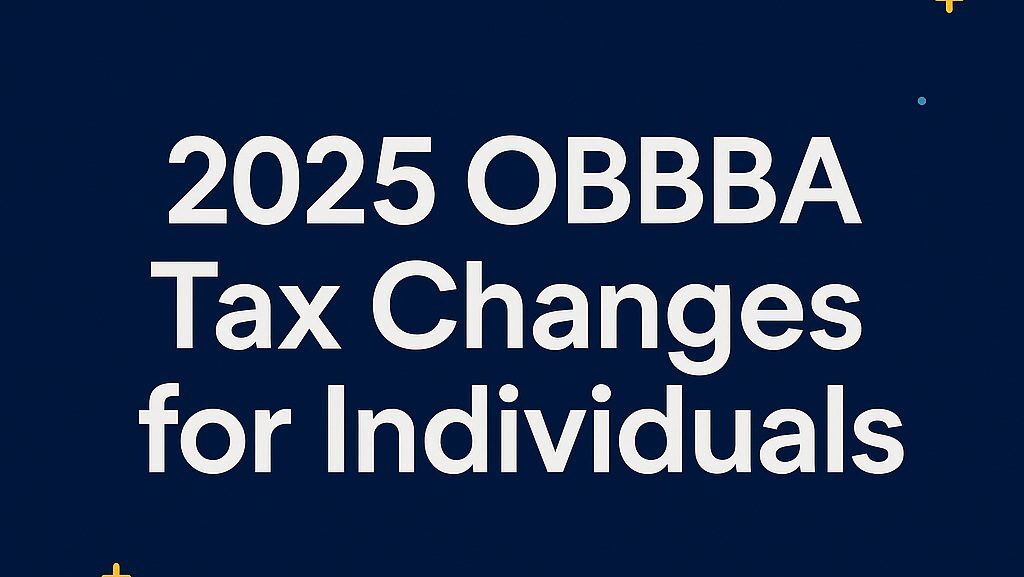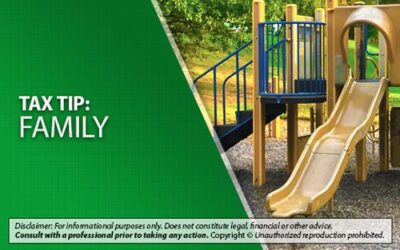2025 One Big Beautiful Bill Act OBBBA Tax Changes for Individuals
The One Big Beautiful Bill Act (OBBBA) was signed into law on July 4, 2025. This landmark legislation permanently extends many tax provisions originally introduced by the 2017 Tax Cuts and Jobs Act (TCJA) while introducing new deductions, credits, and rules designed to help families, individuals, and small businesses.
Most provisions take effect starting with the 2025 tax year (filed in 2026), though some begin later or expire after a set period. Here’s an overview of the key provisions that individuals and families should be aware of.
📌 Federal Tax Rates and Deductions
- Individual Tax Brackets (Permanent): Current rates of 10%, 12%, 22%, 24%, 32%, 35%, and 37% are made permanent.
- C-Corporation Rate (Permanent): The 21% corporate tax rate is preserved. While this applies to business filers, it also impacts planning for pass-through owners.
- Standard Deduction (Permanent): Higher standard deduction is locked in and indexed for inflation. For 2025:
- $15,750 (Single)
- $23,625 (Head of Household)
- $31,500 (Married Filing Jointly)
- Senior Deduction (2025–2028): A temporary $6,000 deduction is available for taxpayers age 65 and older, in addition to the standard deduction.
- Phases out above $75,000 MAGI (single) and $150,000 MAGI (joint).
- Not indexed for inflation.
📌 Child and Family Benefits
- Child Tax Credit (CTC):
- $2,200 per child beginning in 2025, indexed for inflation.
- Refundable portion: $1,700 in 2025, also indexed for inflation.
- Phaseouts remain: $200,000 (Single), $400,000 (Married Filing Jointly).
- Credit for Other Dependents: $500 credit is made permanent.
- Adoption Credit: Enhanced and made partially refundable (up to $5,000).
- Dependent Care Assistance (2026+): Employer-provided dependent care benefits exclusion increased to $7,500.
📌 State and Local Tax (SALT) Deduction
- 2025: Cap rises to $40,000 (all filing statuses except MFS, which is $20,000).
- 2026: Indexed annually by 1% for inflation.
- 2030: Cap reverts to $10,000.
- Phaseout rule: Deduction reduced by 30% of MAGI above $500,000 ($250,000 for MFS), but cannot fall below $10,000.
📌 Employment & Payroll Provisions (Temporary: 2025–2028)
- Tips Deduction: Workers in tipped occupations can deduct up to $25,000 of tips annually.
- Deduction phases out above $150,000 (single) or $300,000 (joint).
- Overtime Deduction: Workers can deduct the premium portion of overtime pay.
- Up to $12,500 (single) or $25,000 (joint).
- Same phaseout thresholds as tips deduction.
📌 Health-Related Provisions
- HSAs (2026+): Expanded eligibility — Bronze and Catastrophic exchange plans now qualify as HDHPs.
- Direct primary care fees count as medical expenses.
- Telehealth visits are covered pre-deductible without disqualifying HDHP status.
- Premium Tax Credit (PTC):
- 2026+: The cap on repayment of excess advance PTC is eliminated — excess APTC must be repaid in full.
- 2027+: Stricter verification rules for income, household size, and lawful presence.
- Lawfully present but non–eligible aliens are no longer PTC-eligible unless they fall into limited categories (lawful permanent residents, Cuban/Haitian entrants, Compact of Free Association migrants).
📌 Education & Student Loan Relief
- 529 Plans (2026+): Expanded to cover K–12 tuition, tutoring, and standardized testing. Annual K–12 distribution cap increases to $20,000.
- Employer Student Loan Repayment: Permanent exclusion of up to $5,250 annually from taxable income, indexed for inflation beginning 2026.
- ABLE Accounts (2026+): Disability eligibility age increased from 26 to 46.
📌 Charitable Contributions
- Non-Itemizers (2026+): May deduct up to $1,000 (single) or $2,000 (joint) without itemizing.
- Itemizers (2026+):
- New 0.5% AGI “floor”: contributions below this amount are not deductible.
- Higher-income taxpayers can still deduct up to 60% of AGI for cash gifts.
- Disallowed amounts can be carried forward only if overall limits are hit.
📌 Savings Provisions
- Trump Accounts (2026–2028): New tax-advantaged savings accounts for children under 18.
- Treasury deposits $1,000 for children born 2025–2028.
- Parents/relatives can contribute up to $5,000 annually with detailed guidelines to be issued later by the Treasury/IRS.
- Limited to low-cost index fund investments.
📌 Gig Economy & Reporting Rules
- Form 1099-K (Retroactive to 2022): Issued only if >$20,000 in payments and 200+ transactions.
- Forms 1099-NEC & 1099-MISC (2026+): Filing threshold raised to $2,000, indexed for inflation in 2027.
- Backup Withholding (2026+): Withholding required only on payments above $2,000 when TIN is missing or invalid.
📌 Gambling Losses
- 2025 onward: Deductions for gambling losses (and related expenses) are limited to 90% of winnings. Applies whether gambling is casual or a trade/business.
📌 Energy & Vehicle Provisions
- Electric Vehicle Credits: Repealed for purchases after September 30, 2025.
- Residential Energy Credits: Expire permanently after December 31, 2025. No credits for installations after that date.
📌 New Car Loan Interest Deduction
- 2025–2028: Taxpayers may deduct up to $10,000 annually in interest paid on loans for new, U.S.-assembled passenger vehicles.
- Phases out above $100,000 MAGI (single) or $200,000 MAGI (joint).
- Vehicle must be new, under 14,000 lbs, and secured by a first lien.
- Deduction available to both itemizers and non-itemizers.
- Refinanced loans remain eligible for the deduction.
📌 Final Takeaway
The One Big Beautiful Bill Act of 2025 reshapes the U.S. tax code for individuals and families. Key OBBBA tax changes highlights include:
- Permanently higher standard deduction and CTC with inflation indexing.
- Temporary boosts like the senior deduction, SALT cap increase, and car loan interest deduction.
- Expanded HSA access, stricter PTC rules, and student loan repayment relief.
- Temporary tax breaks for tips, overtime, and Trump Accounts.
- End of electric vehicle and residential energy credits after 2025.
With many provisions phasing in or out between 2025 and 2029, advance planning is essential. Taxpayers should review these changes now to maximize savings, avoid surprises, and update their strategies for charitable giving, education planning, and payroll deductions.
📖 Read the full text of the One Big Beautiful Bill Act (OBBBA) on Congress.gov: H.R. 1 — 119th Congress
📌 Need Help Navigating the OBBBA Changes?
At AI Tax Consulting PLLC, we help individuals and small business owners in Northern Virginia, Fredericksburg, Stafford, Woodbridge, and nationwide understand how new tax laws like the One Big Beautiful Bill Act (OBBBA) impact their finances.
Whether you need help with individual tax preparation, business tax planning, bookkeeping, IRS representation, or international tax compliance, our CPA-led team provides trusted and personalized guidance.
📞 Schedule a consultation today to discuss how the 2025 OBBBA changes may affect your taxes.
👉 Book an appointment here



